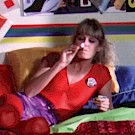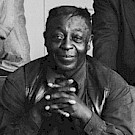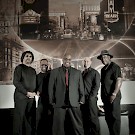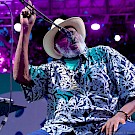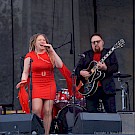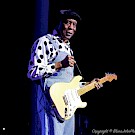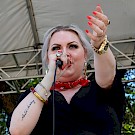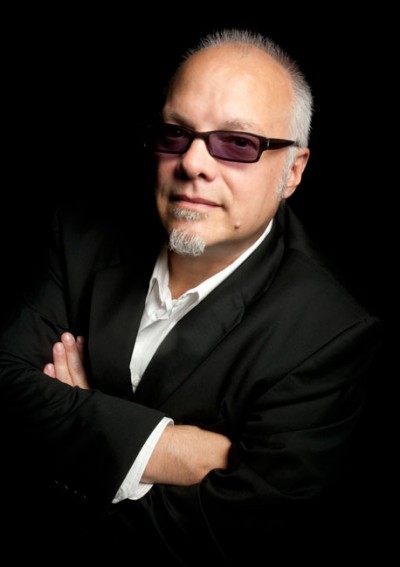 Curtis Salgado
Curtis Salgado
The harmonica-blowing bluesman has seen and experienced plenty during his four decades—a fact that’s apparent after chatting with Curtis Salgado for just a few minutes. Brimming with formidable stories and backed by an encyclopedic knowledge, Salgado is able to rattle off names, dates, places and vignettes of musical history—and that includes recordings that were made before he was even born.
A student and lover of music, Salgado repeatedly says he’s into it all—“blues, soul, rhythm and blues, funk, gospel, everything. I just like good American music." But, it has to be music that moves him, stuff that has “cojones—it's got to have grease to it, it's got to have soul, and I have to believe it,” he says—and "I'm crazy about turning people onto it," which is exactly what he did in the late ‘70s when he started bringing a famous comedian blues records. The night Salgado met John Belushi, he was performing at the Eugene Hotel. It was October 1977 and the actor was hanging around the University of Oregon because he was filming National Lampoon's Animal House.
GUITAR SLIM: "The Things That I Used To Do"
Belushi told Salgado he was about to film an episode of Saturday Night Live with Ray Charles. "The first thing I said to him was, 'You're doing a show with Ray Charles? You gotta ask him about Guitar Slim.' He had one of the biggest blues hits of all time and it was on the charts for 30-some weeks in the 1950s. Ray played piano on it and arranged it. It's a classic blues song—it's like the 'Louie Louie' of blues tunes."
RAY CHARLES: “Hot Rod”
Then Salgado asked Belushi: "'Did you know Ray Charles plays alto saxophone?' And Belushi goes, 'He plays alto sax?' I said, 'Yeah man, he plays alto saxophone on this record called 'Hot Rod' on Live at the Newport Jazz Festival from 1958—he's a great alto saxophone player.’” After learning this from Salgado, Belushi reportedly asked Charles to play saxophone while on the set of SNL. “He hadn't played in three years. But he did.”
FLOYD DIXON: "Hey Bartender"
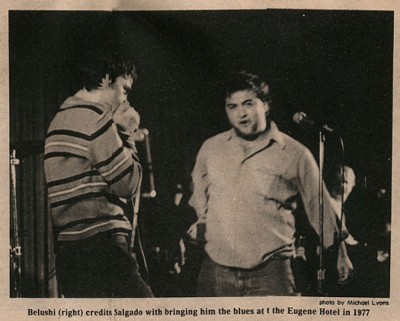 A newspaper clipping from a 1979 Register-Guard article
A newspaper clipping from a 1979 Register-Guard article“One night Belushi goes, 'I want to sit in.' I go, 'Okay, well what do you want to do?' ‘‘Johnny B. Goode.’’ I said, 'No, that’s too corny.' Then he goes, 'Well, how about 'Jailhouse Rock.'’ I said, 'I'll tell you what—I'll bring you a song. I have just the song for you.' I don't know how but I picked the right song for him. I picked the song of a guy I knew personally and who were playing with every now and then: Floyd Dixon. This guy is a brilliant, eccentric piano player in the genre of Charles Brown and Amos Milburn. A great piano player and he’s been making records since just after the war.
"I gave Belushi ‘Hey Bartender.’ ‘You want to sit in? Do this song,’ I said. Next Monday he comes in and goes, ‘Okay, I’ve learned the tune.’ We get up on stage and we’re going to play our set and at the very end I’ll call him up and it’ll be the last song of that set. The place is packed, everybody’s buzzed. I call up Belushi and they go ape shit—they just go nuts! And we’re like, ‘Who is this guy?!’ I haven’t seen him do anything—I still don’t know what Saturday Night Live is. We don’t own a TV, we work on Saturday nights. I’ll admit, I’m a little pissed actually—like this guy hasn’t even done anything and they’re peeing their pants. I had no idea that it was such a popular show. We count off the tune and he’s doing these spastic arm things while he’s singing and it kind of sounds like Joe Cocker. The audience is freaking out and I’m going, ‘This sucks. What the fuck is he doing?’ I didn’t know he did [a] Joe Cocker [impression]. He does the tune and we get off stage and I hop down and he’s right behind me and goes, ‘Hey, what’d you think?’ I go, ‘Is that Joe Cocker?’ He goes, ‘Yeah, I do Joe Cocker, I do an imitation of him.’ And this was the only thing I told him—I’d given him material, I’d brought him tons of records to his house—but the only real advice I gave him: ‘Look, so you’re John Belushi singing like Joe Cocker doing a song by Floyd Dixon.’ I tapped his chest right there in the middle of the dance floor and said, ‘You need to come from here and you gotta be yourself if you’re gonna do this.’ And you know what he said? He goes, ‘Yeah, you’re right.’ I’ll never forget that."
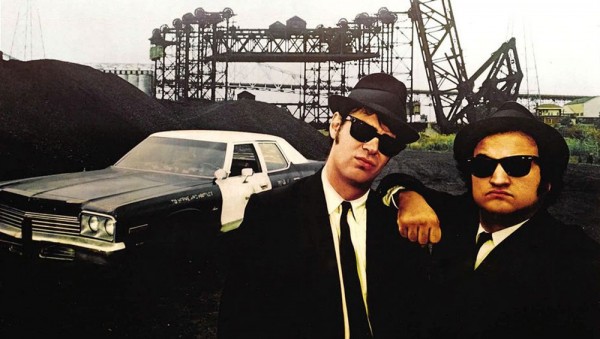 The Blues Brothers: Dan Aykroyd and John Belushi
The Blues Brothers: Dan Aykroyd and John Belushi“We were friends. I saw The Blues Brothers play live, I hung out with him in L.A. It was my rub with fame and definitely upscale movie stuff. I knew John and taught him ‘Hey Bartender.’ What happened was, years later in the 1990s, I’m playing at the Chicago Blues Fest and Floyd Dixon comes up to me and says, ‘Curtis, if it wasn’t for you I wouldn’t of made the biggest royalty check I ever made in my life.’ This is my hero. ‘I want to thank you so much.’ I got choked up. I said, ‘Well, if you don’t mind me asking, how much did you make?’ And he says, ‘My first royalty check was for $78,000.’ And he’s thanking me, giving me credit! This guy’s made 78s since the ‘40s and now he’s telling me, ‘If it wasn’t for you...’ I said, ‘If you don’t mind me asking, what’d you do with it?’ And he looked off into the sky, his eyes gleaming and he goes, ‘I spent it all on the horses—oh, I had a wonderful time.’ And that is the fucking real deal there! That’s a bluesman.”
LORDE: "Glory and Gore"
"Songwriting interests me—I want to be a good songwriter. Believe it or not, the last thing I was listening to was that girl Lorde. I first heard ‘Royals’ on YouTube and I saw it was climbing up the charts. Then I listened to the entire record on a wonderful stereo, and I thought to myself, ‘The bar has been raised!’ She wrote those songs when she was 15 or 16 years old. A minimalist approach, it's all about the vocals and the harmonies. The music frames the voice. The lyrics, the story, with this wry, wicked commentary. None of the pop stars out there—her contemporaries—are this smart. She has adult sensibilities. It's very humbling.”
THE SOUL SEEKERS: “Make A Way”
"They're contemporary musicians in R&B that are on stage with Beyonce and Frankie Beverly and Maze—as touring musicians—but they do this old-school gospel stuff. It's like they're revamping The Dixie Hummingbirds. They're doing gospel in the old quartet way but it's contemporary with a whole band and they're killing it. I would love it if these guys would come and play Portland—I would be front and center."
JOHNNY "GUITAR" WATSON: “Gangster of Love”
“Remember Steve Miller doing this? Well, that was a Johnny ‘Guitar’ Watson song. He's just an incredible musician. I really respect good musicianship. He’s a multi-instrumentalist who writes songs that are great pieces of music. This guy can play piano, plays jazz piano, plays guitar, plays vibes, great arranger, written many, many tunes, and he's had four decades of... he passed away in the 1990s—he died on stage of a heart attack."
BOB MARLEY: African Herbsman—“African Herbsman”
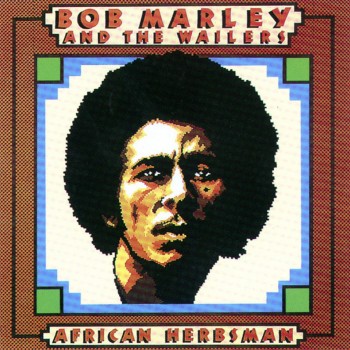 “When I was 20 or 21 years old, Gary Smith, a very good harmonica player, [asked me], ‘Have ya ever heard of reggae?’ ‘No,’ I said. ‘Well,’ he said, ‘you must buy this record’—we’re talking an LP and it was from Jamaica. I don't think it's made of vinyl—it's thicker, almost like glass. This record has about 14 songs per side and I treasure it. The producer is the great Lee ‘Scratch’ Perry and from this record comes the song ‘African Herbsman’—the whole record is amazing and brilliant, and that to me is the best Bob Marley stuff. Of course, I freaked out over the music and its history and the whole Jamaican story.”
“When I was 20 or 21 years old, Gary Smith, a very good harmonica player, [asked me], ‘Have ya ever heard of reggae?’ ‘No,’ I said. ‘Well,’ he said, ‘you must buy this record’—we’re talking an LP and it was from Jamaica. I don't think it's made of vinyl—it's thicker, almost like glass. This record has about 14 songs per side and I treasure it. The producer is the great Lee ‘Scratch’ Perry and from this record comes the song ‘African Herbsman’—the whole record is amazing and brilliant, and that to me is the best Bob Marley stuff. Of course, I freaked out over the music and its history and the whole Jamaican story.”
COUNT BASIE: Count Basie Swings, Joe Williams Sings—"The Come Back"
“I grew up on Count Basie and Joe Williams is a major influence for me. My father had this record, and I would find out later that it was a huge hit and rejuvenated the career of Count Basie after World War II—and launched Joe Williams. I saw Count Basie when I was 13 years old at McArthur Court in Eugene. I can tell you who the band members were in the band...”
LITTLE WALTER: “Roller Coaster” and “Off The Wall”
“I play harmonica and I'm not too bad at it. There are many great harmonica players. One of the very best—and this is no jive—was Paul deLay here in Portland. Paul worked very hard in creating a style that was totally personal. He didn't want to sound like anybody else. And that's real hard to do with the blues! I think he accomplished that, but the baddest man who ever walked the planet on the harmonica and playing the deepest blues with it was Marion Walter Jacobs aka Little Walter.
“The harmonica is a cool instrument. It's the only one where you actually can breathe music—blowing out and drawing in. To most musicians, it's a very annoying instrument because most people who play it really don't know how. They use it for ambients, a vibe. But Little Walter played it as a saxophone with the most incredible tone and timing and was melodic. He was a genius. Listen to ‘Roller Coaster.’ The song stays on one cord with Bo Diddley playing guitar as Little Walter just cuts loose improvising. He’s basically playing bebop on the small 10-hole harmonica. He swings like crazy with the most vicious tone. The song is a tour de force and every harp player who’s worth his salt has tried to learn it.
“‘Off The Wall’ is brilliant! This time a swinging blues shuffle with a wonderful fat tone and swinging like mad—played like a jazz saxophone from the swing era. He never played the same thing twice, and on top of that, he was in his early 20s when he recorded these songs—and to this day nobody can touch him.”
ANITA O'DAY: "Let Me Off Uptown" and “Old Devil Moon”
“Dinah Washington, Billie Holiday, Betty Carter, Ella Fitzgerald are the names that are associated with jazz singing. But the first I heard as a little kid was Anita O'Day. My father had 78 rpm records from the swing era of the Gene Krupa big band, and I would play one particular record over and over again. It was Anita O'Day singing with Gene Krupa—the song was boogie blues. I just loved her voice—it had a smoky sound to it. And of course I was too little to understand anything about what a tambour was, but she hit my auditory nerve just right. When I got older I bought her LPs. She was an extremely respected jazz singer and an innovator and was added to the list her peers. The two songs I suggest I think were recorded in the ‘50s. The trumpet player is the great Roy Eldridge.”
O. V. WRIGHT: “I Can’t Take It” and “Afflicted”
“Sam Cooke, Otis Redding, Al Green, Ray Charles, Johnnie Taylor: These five gentlemen are the most popular soul singers and they sold more records and stayed popular for decades. Only one of them is still alive—all the rest of them passed away—but all five of them are still selling records and recordings and [their music is] used in TV spots and movies. And even though I would sacrifice a body part to have the voice of any of these five soul singers, the one who I think is the deepest soul singer of them all, the one who hits me in a way that gives me chills, who never had the popularity or sold as many records is O. V. Wright. Back in the ‘70s, I was invited to stay with a damn good soul singer and bluesman by the name of Sonny Rhodes in Oakland. Sonny gave me two LPs, one called A Nickel And A Nail And Ace Of Spades and the other was called Nucleus Of Soul. He said, "This is what you’re looking for." He was right! It changed my life—this was and is deep Southern soul, not heard in Eugene, Oregon, unless you were black and came from the south and brought it with you. This was on a deeper level, and I freaked out over it. And O. V. Wright, a high tenor voice—you can tell he's a gospel singer, most of them are—but O. V. has a sadness, an irony that just moves me like no other. Listen to “I Can’t Take It” and “Afflicted.” Warning: These songs are soul ballads—the true test of a singer. If your hair doesn't stand up—or catch on fire—you’ve got a hole in your soul.”
LOCAL LOVES:
The Decemberists, Liv Warfield, Lloyd Jones, Mel Brown, Dan Balmer
DOWNLOAD CURTIS SALGADO: “20 Years Of B.B. King”
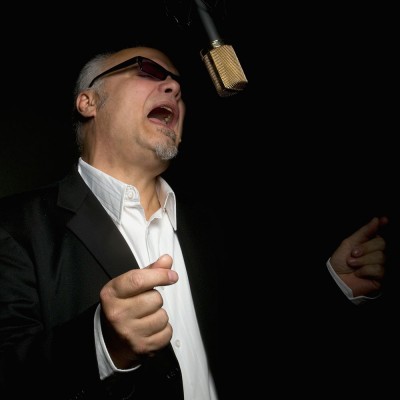 “I wrote this with a friend of mine out of Nashville whose name is David Duncan. The band is out of Los Angeles—L.A.'s finest group of studio musicians who, collectively, have made recordings with just about everybody. A who's who of top artist from Jimi Hendrix to Bonnie Raitt to Bob Dylan to B.B. King to Jerry Lee Lewis to Crosby, Stills and Nash to Paul Simon to Taj Mahal… I went to the studio with a song idea—just the chords and the lyrics. That's it, and no rehearsal. Tell them what you want and they will make your little song better than you could've hope for—plus they’re a lot of fun. Great people and very professional.
“I wrote this with a friend of mine out of Nashville whose name is David Duncan. The band is out of Los Angeles—L.A.'s finest group of studio musicians who, collectively, have made recordings with just about everybody. A who's who of top artist from Jimi Hendrix to Bonnie Raitt to Bob Dylan to B.B. King to Jerry Lee Lewis to Crosby, Stills and Nash to Paul Simon to Taj Mahal… I went to the studio with a song idea—just the chords and the lyrics. That's it, and no rehearsal. Tell them what you want and they will make your little song better than you could've hope for—plus they’re a lot of fun. Great people and very professional.
“This song is one of the best that Mr. Duncan and myself have written so far. ‘20 Years Of B.B. King’ is not about B.B. himself but a song of infidelity, which definitely makes it a blues song. The party in question is a man who is a big fan of B.B. King’s who says, ‘I've learned more about the blues in two weeks from you than 20 years of B.B. King.’ We also mention eight B.B. King songs tucked away in the lyrics of the song itself. I think is pretty clever. Put the song on your stereo system and crank it up.”

